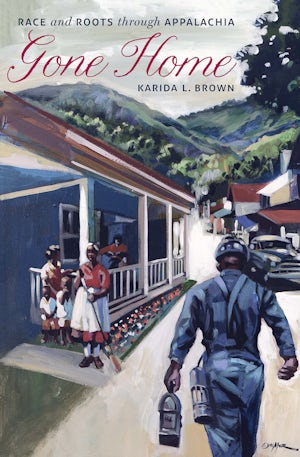Gone Home
Race and Roots through Appalachia
By Karida L. Brown
264 pp., 6.125 x 9.25, 16 halftones, 2 tables, bibl., index
-
Paperback ISBN: 978-1-4696-6606-8
Published: August 2021 -
Hardcover ISBN: 978-1-4696-4703-6
Published: September 2018 -
E-book EPUB ISBN: 978-1-4696-4704-3
Published: August 2018 -
E-book PDF ISBN: 979-8-8908-5546-6
Published: August 2018
Buy this Book
- Paperback $24.95
- Hardcover $29.95
- E-Book $19.99
For Professors:
Free E-Exam Copies
Awards & distinctions
2019 Mary Douglas Prize for Best Book in the Sociology of Culture, Section on Culture, American Sociological Association
2019 Distinguished Contribution to Scholarship Book Award, Race, Gender, and Class Section, American Sociological Association
Finalist, 2019 PROSE Award in Anthropology, Criminology, and Sociology, Association of American Publishers
Runner-Up, 2018 Weatherford Award for Nonfiction, Berea College and Appalachian Studies Association
Honorable Mention, Otis Dudley Duncan Award, Sociology of Population Section, American Sociological Association
Drawn from over 150 original oral history interviews with former and current residents of Harlan County, Kentucky, Brown shows that as the nation experienced enormous transformation from the pre- to the post-civil rights era, so too did black Americans. In reconstructing the life histories of black coal miners, Brown shows the mutable and shifting nature of collective identity, the struggles of labor and representation, and that Appalachia is far more diverse than you think.
About the Author
Karida L. Brown is assistant professor of sociology and African American studies at the University of California, Los Angeles.
For more information about Karida L. Brown, visit
the
Author
Page.
Reviews
“In this tale of the collective African-American search for a place to call home, Brown provides an insightful look at 20th-century American culture.”--Publishers Weekly
“Karida L. Brown’s work continues to complicate Appalachian history by surveying the lived experiences of black residents in Harlan County, Kentucky. . . . The personal stories of black Appalachians provide useful data for seasoned researchers.”--Journal of Southern History
“Brown is an engaging writer . . . This book provides insight into the interconnected issues of identity formation, social and geographic mobility, and the concept of homeplace, along with the effects of quality education and the movement of civil rights. Gone Home: Race and Roots through Appalachia does all of this superbly.”--Journal of Appalachian Studies
“Engaging. . . . By helping to make visible a population too long neglected, Karida L. Brown is doing work that is especially important today.”--American Historical Review
“Like the best of such case studies, Brown’s intimate portrait of African Americans’ ties to a single place—much of it cast in the form of “back home” nostalgia—tells us much about their resilience and resourcefulness.”--Journal of American History
“In Gone Home, Brown fills the pages with stories of people who lived in Benham and Lynch; she uses many of their own words to express their lived experiences. In combining historical and sociological methodologies, Brown successfully shows that although physical elements of these Black communities in Appalachia have largely disappeared, the communities themselves still thrive in migrants’ memories and their continued connections with one another.”--Journal of African American History


